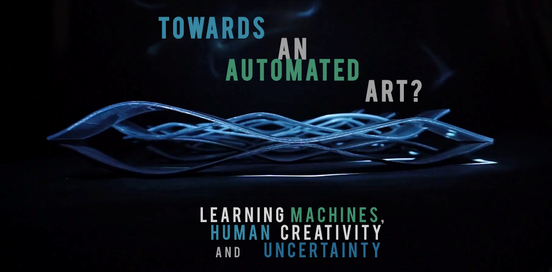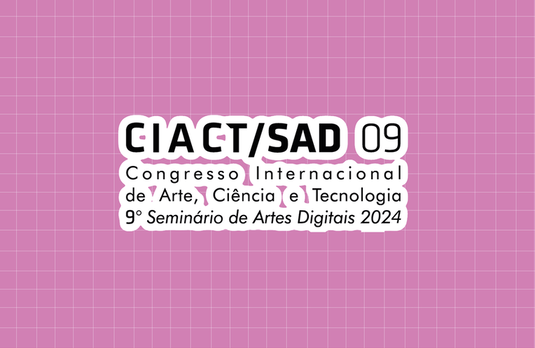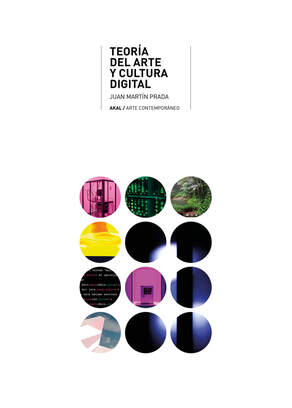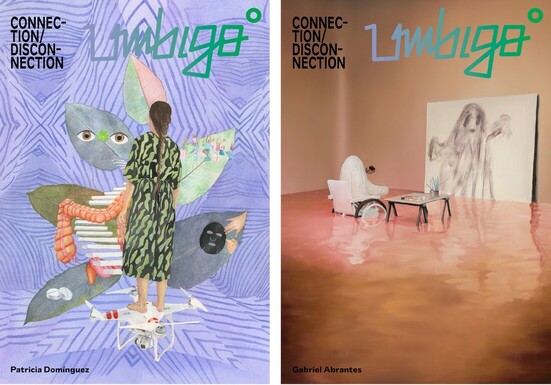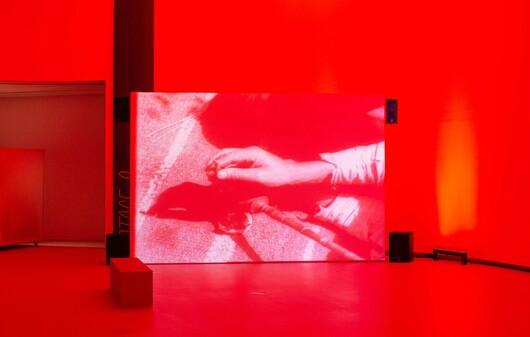Call for Papers: Towards an Automated Art?
Learning Machines, Human Creativity and Uncertainty
International Conference, Lisbon, 24 May, 2024
Cultural production is becoming progressively controlled by machine-made calculations. Computational tools in the form of algorithms and AI seem to be getting closer to the loop of producing, distributing, selling and validating artworks in a completely digital context. It is possible to predict that, in the near future, they will be able to make their own decisions and produce new creative forms without direct human hand intervention. The arrival of an entire synthetic creative system is drawing nigh.
[...] Are we finally entering a new art ecosystem where artists are as replaceable as images? Are we becoming immersed in a new mechanized and financialized art system where artworks can be rapidly produced, consumed and wasted? Can human creativity survive in this context? Can machines really learn how to make art?
This one-day conference aims to provide a space for interdisciplinary discussion, bringing together different perspectives on the interaction between creative practices and digital technologies, with a particular emphasis on the still uncertain impact of AI on contemporary arts.
The conference if coordinated by Helena Barranha and Luis D. Rivero-Moreno, members of the of the Cluster of Art, Museums and Digital Cultures, IHA-NOVA FCSH.
Organisation: Institute of Art History, School of Social Sciences and Humanities, Universidade NOVA de Lisboa, Universidad de León (Spain): Instituto de Humanismo y Tradición Clásica and Grupo de Investigación de Estudios Literarios y Comparados. Insólito, Género y Humanidades Digitales; Instituto Superior Técnico, Universidade de Lisboa; and Museu Zer0, Tavira.
Call for papers open until 22 March, 2024. More information here.
Image: Rodrigo Gomes, Deep White for black, 2016. Courtesy of the artist.
Learning Machines, Human Creativity and Uncertainty
International Conference, Lisbon, 24 May, 2024
Cultural production is becoming progressively controlled by machine-made calculations. Computational tools in the form of algorithms and AI seem to be getting closer to the loop of producing, distributing, selling and validating artworks in a completely digital context. It is possible to predict that, in the near future, they will be able to make their own decisions and produce new creative forms without direct human hand intervention. The arrival of an entire synthetic creative system is drawing nigh.
[...] Are we finally entering a new art ecosystem where artists are as replaceable as images? Are we becoming immersed in a new mechanized and financialized art system where artworks can be rapidly produced, consumed and wasted? Can human creativity survive in this context? Can machines really learn how to make art?
This one-day conference aims to provide a space for interdisciplinary discussion, bringing together different perspectives on the interaction between creative practices and digital technologies, with a particular emphasis on the still uncertain impact of AI on contemporary arts.
The conference if coordinated by Helena Barranha and Luis D. Rivero-Moreno, members of the of the Cluster of Art, Museums and Digital Cultures, IHA-NOVA FCSH.
Organisation: Institute of Art History, School of Social Sciences and Humanities, Universidade NOVA de Lisboa, Universidad de León (Spain): Instituto de Humanismo y Tradición Clásica and Grupo de Investigación de Estudios Literarios y Comparados. Insólito, Género y Humanidades Digitales; Instituto Superior Técnico, Universidade de Lisboa; and Museu Zer0, Tavira.
Call for papers open until 22 March, 2024. More information here.
Image: Rodrigo Gomes, Deep White for black, 2016. Courtesy of the artist.
Call for Papers | CIACT/SAD 2024
The International Congress on Art, Science and Technology and Digital Arts Seminar (CIACT-SAD) is organised by LabFront (Laboratório de Poéticas Fronteiriças) at State University of Minas Gerais, Belo Horizonte, Brazil, with the collaboration of scholars, researchers and organisations from different countries.
The transdisciplinary programme of the congress includes the participation of senior researchers as well as master’s and doctoral students. Each year, the seminar section is curated around a specific theme, as happened in the eighth edition, in 2023, dedicated to “Crises”. The video recordings are available on the LabFront YouTube Channel.
This year, the congress will take place in Belo Horizonte/MG, from 27 to 31 May 27 with the theme "Vida/Life". As in the previous editions, the 9th CIACT-SAD will be chaired by Pablo Gobira, Professor at the State University of Minas Gerais and a member of the Cluster of Art, Museums and Digital Cultures, IHA-NOVA FCSH.
The Call for Papers is now open! Deadline for abstract submission: 5 February, 2024.
More information here.
The International Congress on Art, Science and Technology and Digital Arts Seminar (CIACT-SAD) is organised by LabFront (Laboratório de Poéticas Fronteiriças) at State University of Minas Gerais, Belo Horizonte, Brazil, with the collaboration of scholars, researchers and organisations from different countries.
The transdisciplinary programme of the congress includes the participation of senior researchers as well as master’s and doctoral students. Each year, the seminar section is curated around a specific theme, as happened in the eighth edition, in 2023, dedicated to “Crises”. The video recordings are available on the LabFront YouTube Channel.
This year, the congress will take place in Belo Horizonte/MG, from 27 to 31 May 27 with the theme "Vida/Life". As in the previous editions, the 9th CIACT-SAD will be chaired by Pablo Gobira, Professor at the State University of Minas Gerais and a member of the Cluster of Art, Museums and Digital Cultures, IHA-NOVA FCSH.
The Call for Papers is now open! Deadline for abstract submission: 5 February, 2024.
More information here.
Teoría del arte y cultura digital (2023)
A new book by Juan Martín Prada
This book addresses the main questions and challenges of aesthetics and art theory in the increasingly complex context of digital culture. It attempts to offer a detailed study of the new questions, categories and concepts that have emerged in the field of art as a result of the transformations brought about by the computer revolution, with special emphasis on what has happened in the first two decades of the 21st century.
The texts emphasise central issues in recent art, such as the production of subjectivity, difference, identity, participation, etc., analysing them in their specific relationship with some of the new technological developments (social networks, artificial intelligence, augmented reality, virtual reality, blockchain, etc.).
A book, in short, aimed at understanding the impact that digital evolution is having on the development of contemporary artistic creation, as well as the new paths that are opening up for its theorisation, dissemination and commercialisation.
More information and table of contents here.
A new book by Juan Martín Prada
This book addresses the main questions and challenges of aesthetics and art theory in the increasingly complex context of digital culture. It attempts to offer a detailed study of the new questions, categories and concepts that have emerged in the field of art as a result of the transformations brought about by the computer revolution, with special emphasis on what has happened in the first two decades of the 21st century.
The texts emphasise central issues in recent art, such as the production of subjectivity, difference, identity, participation, etc., analysing them in their specific relationship with some of the new technological developments (social networks, artificial intelligence, augmented reality, virtual reality, blockchain, etc.).
A book, in short, aimed at understanding the impact that digital evolution is having on the development of contemporary artistic creation, as well as the new paths that are opening up for its theorisation, dissemination and commercialisation.
More information and table of contents here.
Art, Museums and Digital Cultures | Interviews
A collaboration between Umbigo magazine and the cluster
The Umbigo magazine issue #86 on Connection/Disconnection” (Sept.-Dec. 2023) is now available. It marks the beginning of a series of interviews carried out in collaboration with the Art, Museums and Digital Cultures cluster. These interviews aim to deepen and expand some of the topics addressed at the 2021 International Conference, namely the cultural and political implications of the post-digital condition and its repercussions on the world of contemporary art and museums.
In this first interview, José Pardal Pina talks with Juan Martín Prada, member of the cluster since its origin and author of Prácticas artísticas e Internet en la época de las rede sociales [Artistic Practices and the Internet in the Age of Social Media] (2015) and Art Theory and Digital Culture (2023). Among other questions, Juan Martín Prada reflects here on digital mediation in museums, the role of big technological corporations and recent advances in artificial intelligence.
The interview is available here. This and other issues of Umbigo magazine can be purchased online.
Images: Umbigo #86 covers. Art Projects: Patricia Dominguez and Gabriel Abrantes, 2023. Graphic Desgin: António Néu.
A collaboration between Umbigo magazine and the cluster
The Umbigo magazine issue #86 on Connection/Disconnection” (Sept.-Dec. 2023) is now available. It marks the beginning of a series of interviews carried out in collaboration with the Art, Museums and Digital Cultures cluster. These interviews aim to deepen and expand some of the topics addressed at the 2021 International Conference, namely the cultural and political implications of the post-digital condition and its repercussions on the world of contemporary art and museums.
In this first interview, José Pardal Pina talks with Juan Martín Prada, member of the cluster since its origin and author of Prácticas artísticas e Internet en la época de las rede sociales [Artistic Practices and the Internet in the Age of Social Media] (2015) and Art Theory and Digital Culture (2023). Among other questions, Juan Martín Prada reflects here on digital mediation in museums, the role of big technological corporations and recent advances in artificial intelligence.
The interview is available here. This and other issues of Umbigo magazine can be purchased online.
Images: Umbigo #86 covers. Art Projects: Patricia Dominguez and Gabriel Abrantes, 2023. Graphic Desgin: António Néu.
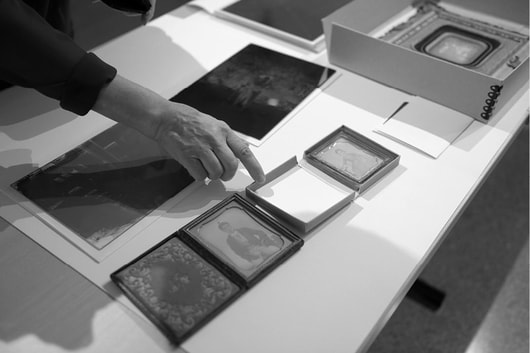
Photographic Archives: Study, Digitisation and Dissemination
Workshop, 17 May 2023
This workshop brought together a group of researchers from the Institute of Art History who, directly or indirectly, have explored the relationship between Archives and Photography in their academic or artistic work. The event provided a space for debate during the stay, in Lisbon, of Pilar Irala Hortal, Professor at University of San Jorge and Director of the Jalón Ángel Photographic Archive, in Zaragoza, Spain, and included the participation of several professionals from the Lisbon Municipal Archive, who are responsible for the conservation, digitisation, display and communication of photographic collections.
Venue: Arquivo Municipal de Lisboa | Fotográfico,
More information and programme available at:
https://workshop-arquivosfotograficos.weebly.com/
Organisation:
Institute of Art History, Universidade NOVA de Lisboa – School of Social Sciences and Humanities / IN2PAST – Associate Laboratory for Research and Innovation in Heritage, Arts, Sustainability and Territory
Arquivo Municipal de Lisboa | Fotográfico
Instituto Superior Técnico, Universidade de Lisboa
Image: Arquivo Municipal de Lisboa
Workshop, 17 May 2023
This workshop brought together a group of researchers from the Institute of Art History who, directly or indirectly, have explored the relationship between Archives and Photography in their academic or artistic work. The event provided a space for debate during the stay, in Lisbon, of Pilar Irala Hortal, Professor at University of San Jorge and Director of the Jalón Ángel Photographic Archive, in Zaragoza, Spain, and included the participation of several professionals from the Lisbon Municipal Archive, who are responsible for the conservation, digitisation, display and communication of photographic collections.
Venue: Arquivo Municipal de Lisboa | Fotográfico,
More information and programme available at:
https://workshop-arquivosfotograficos.weebly.com/
Organisation:
Institute of Art History, Universidade NOVA de Lisboa – School of Social Sciences and Humanities / IN2PAST – Associate Laboratory for Research and Innovation in Heritage, Arts, Sustainability and Territory
Arquivo Municipal de Lisboa | Fotográfico
Instituto Superior Técnico, Universidade de Lisboa
Image: Arquivo Municipal de Lisboa
1st Webinar on Art, Museums and Digital Cultures
A collaboration between maat and IHA - NOVA FCSH, Lisbon, 22 October 2020
The digital transition process at cultural institutions has quickened in recent months. It is, thus, important to reflect on what has been made available and the difference between the digitisation of artworks or contents in physical formats and the development of art and
curatorial projects specifically designed for digital and network media.
At a time when access to physical spaces has been placed on hold, the transfer of some museum activities to digital formats has allowed us to maintain communication with regular visitors, as well as to capture new audiences. However, and paradoxically, this process has accentuated the geographical, social and cultural discrepancies in the access to information technologies. According to a UNESCO report published in May 2020, in the first few months of the pandemic, huge disparities were seen internationally in institutions’ capacity to respond.
In this context, the fact that most museums are online is not enough. It is necessary to discuss what content, activities, institutions and audiences coexist in these new online cultural circuits and what forms of segregation are emerging or worsening. These issues are the starting point for the first webinar on Art, Museums and Digital Cultures, promoted by maat and the Institute of Art History, Universidade NOVA de Lisboa, which anticipates the international conference to be held in Abril 2021.
More information and programme available at:
maat.pt/en/event/1st-webinar-art-museum-and-digital-cultures
Organisation:
Museum of Art, Architecture and Technology, Lisbon.
Institute of Art History, School of Social Sciences and Humanities, Universidade NOVA de Lisboa.
Image: Visions at the End of the World, Carlos Casas with Filipe Felizardo, 2020. Courtesy of EDP Foundation.
A collaboration between maat and IHA - NOVA FCSH, Lisbon, 22 October 2020
The digital transition process at cultural institutions has quickened in recent months. It is, thus, important to reflect on what has been made available and the difference between the digitisation of artworks or contents in physical formats and the development of art and
curatorial projects specifically designed for digital and network media.
At a time when access to physical spaces has been placed on hold, the transfer of some museum activities to digital formats has allowed us to maintain communication with regular visitors, as well as to capture new audiences. However, and paradoxically, this process has accentuated the geographical, social and cultural discrepancies in the access to information technologies. According to a UNESCO report published in May 2020, in the first few months of the pandemic, huge disparities were seen internationally in institutions’ capacity to respond.
In this context, the fact that most museums are online is not enough. It is necessary to discuss what content, activities, institutions and audiences coexist in these new online cultural circuits and what forms of segregation are emerging or worsening. These issues are the starting point for the first webinar on Art, Museums and Digital Cultures, promoted by maat and the Institute of Art History, Universidade NOVA de Lisboa, which anticipates the international conference to be held in Abril 2021.
More information and programme available at:
maat.pt/en/event/1st-webinar-art-museum-and-digital-cultures
Organisation:
Museum of Art, Architecture and Technology, Lisbon.
Institute of Art History, School of Social Sciences and Humanities, Universidade NOVA de Lisboa.
Image: Visions at the End of the World, Carlos Casas with Filipe Felizardo, 2020. Courtesy of EDP Foundation.
